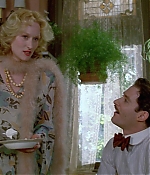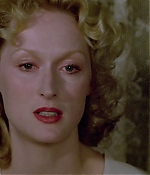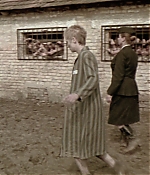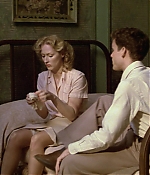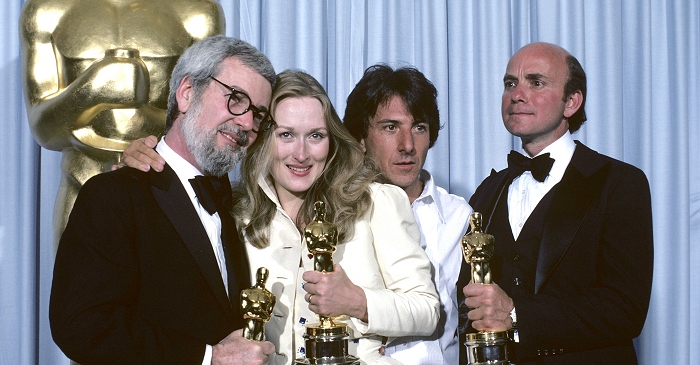|
Simply Streep is your premiere online resource on Meryl Streep's work on film, television and in the theatre - a career that has won her acclaim to be one of the world's greatest living actresses, winning three Academy Awards for "Kramer vs. Kramer", "Sophie's Choice" and "The Iron Lady". Created in 1999, Simply Streep has built an extensive collection over the past 25 years to discover Miss Streep's body of work through thousands of photographs, articles and video clips. Enjoy your stay and check back soon.
|
This Sunday’s spotlight features one of Meryl’s best performances of all time – in Alan Pakula’s 1982 “Sophie’s Choice”. To cover the film, lots of updates have been made. All of the production stills, promotional pictures and on-set pictures have been re-uploaded with many new additions, alongside photoshoot pictures to promote the film. Over 1.500 DVD screencaptures have been re-added as well. In the video archive, four new clips have been uploaded, and the 2001 documentary on the film, Death Dreams Of Mourning is still worth a watch. Production notes and review after the cut. As always, please share your thoughts on the film in the comments.
Alan J. Pakula’s “Sophie’s Choice”, from William Styron’s novel about the after-effects of Holocaust evil, gives us film’s most memorable incarnation of survivor’s guilt. If Meryl Streep had inscribed no performance other than this film’s tortured Polish woman who can’t forgive herself for continuing to live while witnessing so much wrenching death, it would have insured her place in film history. Sophie is forced to make many choices – not between life and death, but between death and even worse death. History, despite its overwhelming presence, isn’t what gives Sophie’s Choice its power. It’s Streep’s tragic heroine tearing at our hearts, as she lives and relives the agony she never can shake for long. She throws herself into desperate, fleeting breakouts into sex and drink, revolving around her American Jewish lover, Nathan (Kevin Kline), equally damaged in different ways. Life, intoxicating as it can get during these brief, heady interludes, is never a match for death. Sophie’s tragedy is that she can’t see how heroic she has been, and is. She thinks of herself as a failure. Streep’s pale-skinned, delicate features become a geography of human torment. Her immersion in the character of Sophie includes an immersion in the Polish language – not just impersonation, but internalization. She has spoken of connecting with her own inner gutteral sounds. So it’s not just a matter of getting the sound right – although her flawed, heavily accented English is pitch-perfect. It’s also a matter of pulling from her gut a primal depth of sound that contributes to Sophie’s innate earthiness, liveliness, integrity, never long able to escape being engulfed by an undertow of sadness. She’s not just an ambulatory accent; she’s a personification of soul-sickness, weariness, too much experience of the wrong kind, from the day her stomach convulses when she learns that the respected law professor father in Cracow, who she adored and whose love she craved, whose speeches she dutifully typed, was a rabid anti-Semite who helped devise the Final Solution. Being sympathetic to the Resistance but stopping short of getting actively involved doesn’t keep her from being rounded up with her two small children and stuffed into an Auschwitz-bound boxcar, a Polish Catholic as doomed as the Jews she accompanies. Streep is all the more affecting for having chosen to let us see the control Sophie exercises – most of the time.
Kevin and Peter are two of the great funny guys. People would say, ‘Was it sad to make?’ and I’d be chirping on and on, ‘No, we had the greatest time, it was so fun!’ It sounds dreaful, but we had to. In the olden days, when I had a memory, I could remember song lyrics from the first time I heard them, things like that. That’s a facility – it didn’t take a lot to learn the sound of the languages. I took a Berlitz course in Polish. And I read poetry out loud, in order to see what it felt like to move emotion through you in an alien way. By the time I finished, it was part of my larynx; it wasn’t separate from me. (Meryl Streep, Entertainment Weekly, March 2000)
Much of what she says is with her eyes, sometimes candid, sometimes breaking the gaze of her friend and confessor, Peter MacNicol’s young observer figure and Styron surrogate, Stingo. He literally gives the film much of its voice, as narrator and innocent novice who comes to Brooklyn from Virginia in 1947 to become a novelist, touchingly following in the footsteps of Thomas Wolfe and, inevitably in his literary style, Faulkner. Structurally, he’s necessary. He’s the one who hears Sophie’s secrets, hitherto hidden parts of her past she can’t divulge to Nathan – including one final soul-destroying one. Not that Styron – or Pakula – gives the Southern writer the best of anything. Of the character’s romantic ardor and talent with language there is no doubt. But he’s a bit of a pipsqueak, a blank slate, unformed, with the personality of sushi. Pakula, of Polish-Jewish lineage, has said that if his father hadn’t come to America, his family might well have perished at Auschwitz. Certainly, there is conviction in his film’s measured progression of moods. Its problematic flashbacks from the novel never break the momentum – although a lot of the tension in them comes from the frozen alertness and fear in Streep’s eyes as Sophie, hating herself more and more each time she falls back on survival reflexes. Pakula and his cinematographer, Nestor Almendros, take a chance by contrasting the desaturated Agfacolor-like concentration camp sequences with Sophie’s recollection of them in closeup, face framed by spun-gold hair, lips painted scarlet, visage bathed in icy blue light that reinforces her self-image as walking corpse, a vision of dead loveliness. It’s an esthetic gamble that wins. We understand viscerally why the young writer becomes drawn to her and longs to supplant Nathan as her lover. Today, you’d call Sophie and Nathan co-dependent enablers for their shared sado-masochism. They’re love and death in the same package. Since Sophie and Nathan have befriended the writer named Stingo, and drag him from his solitude in their restored Victorian Brooklyn rooming house to party and join their spirited capers, the element of betrayal is present in spades, too. After Sophie drinks with Stingo when Nathan isn’t around, Nathan accuses Stingo of moving in on “his girl” and accuses Sophie of letting him. Nathan’s paranoia on this score isn’t altogether unfounded. Still, the brilliant, impulsive and, on rare occasions, tender Nathan’s roller-coaster ups and downs suggest that not all is well with him either as he seesaws between manic elation and murderous depression. Nathan’s extremes leave Kline without the equivalent of Streep’s detailing – her brilliant, seemingly improvisatory way of sometimes letting the faintest curl of an extended finger, or a vocal hesitation, or a distracted tugging at a loose strand of her golden hair do the talking. She’s cool, but avoids mannerism. With Nathan, you quickly just wait for the next outsized gesture. Pakula, ever sensitive to mood, charges the emotional air with tense expectation. It gets the film past some slack pacing.
We don’t have HBO on our TV at home, but the HBO movies show up on the screen all scrambled. One night, ‘Sophie’s Choice’ came on. I could hear it, but I couldn’t see it. And I sat there for twenty minutes, and I looked at it – all scrambled and fuzzy, with little corners of the movie showing up on the screen. We had just bought a video camera to record the kids growing up. Home movies. And it occured to me as I was watching the scrambled-up ‘Sophie’s Choice’… you know, I have my own home movies. They’re my real movies. When other people see them, they may see the plot and the scenery and the actors. When I see them, though… I see something else. I’m watching a different movie. I see them and I think about the place where I lived when we were filming the movies, and where we ate, and the arguments we had about different scenes… that’s what I was thinking about when I watched the jumbled-up ‘Sophie’s Choice’. I have my own home movies, but everyone else gets to see them. They’re reminders of my life, and they’re right out there. (Meryl Streep, Esquire, December 1984)
Kline’s is a performance insufficiently appreciated for its choices and even subtlety, partly because Nathan’s paranoid schizophrenic mood swings make us uncomfortable, squirmy. MacNicol’s Stingo does, too, because whatever else he is – sensitive, good, chivalric – he’s also something of a drip. It was Streep who recommended Kline to Pakula even before she was cast as Sophie. Cloaked in inevitability as her Oscar®-winning performance is, it’s illuminating to recall that Streep was far from a shoo-in for the role. Styron went on record as favoring Ursula Andress as Sophie. Pakula’s first choice was Liv Ullmann for her ability to project the foreignness that would add to her appeal in the eyes of an impressionable, romantic Southerner. Ullmann went on to other projects when Pakula took two years to fashion the screenplay. Polish actress Magda Vasaryova, Barbra Streisand, Marthe Keller and Streep (like Pakula, a Yale Drama School grad) threw their hats in the ring. Finally, Streep prevailed, a Slavic Blanche DuBois, gallantly but vainly trying to outrun her conviction that she owes the universe a death – hers.
Frederik’s Review
In “Sophie’s Choice”, Meryl Streep not only gives one of the best performances of her career, but one of the best female performances in film history. Even thirty years after its release, Sophie still tops the list of critics’ favorite and best roles. In the beginning, the character comes off as a mystery. You don’t know why this Polish woman is in Brooklyn, why she lives in a relationship with Nathan, why she bears his temper and frail mind. Throughout the movie, the layers of the character are peels like an onion, and with each revelation the character grows in depth and tragedy. Maybe Mike Nichols put it best in an interview when he said, that it takes until the end of the film and its revelation that you realise this character has been dead inside from the very beginning of the film. It’s hard to imagine anyone else in the part as Meryl earns it from the first scene. The way she immerses into the character and the brilliant rendition of speaking German with a polish accent is a masterclass of acting. And while Meryl is wonderfully supported by Kline and MacNicol, the film feels very slow at times. Given the premise of the story, “Sophie’s Choice” doesn’t serve as an entertaining film but as a convincing adaptation of a novel, the kind of film that isn’t made anymore, because it has been hardly bankable back then and would be impossible to make these days. “Sophie’s Choice” is recommended to everybody wondering why Meryl has been the definite actress of the Eighties.


